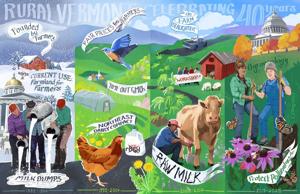Rural Vermont Celebrates 40 Years of Advocacy Amid Cannabis Shift

URGENT UPDATE: Rural Vermont is celebrating 40 years of advocacy, marking a significant transformation from the 1985 agricultural crisis to today’s evolving cannabis landscape. This milestone highlights the relentless efforts of local farmers and advocates who have fought for equity and sustainable practices in the face of economic challenges.
In 1985, American farmers faced an unprecedented crisis, with farm product prices plummeting and interest rates soaring. Thousands of farms shut down due to unfair lending practices, leaving communities devastated. In a powerful push for awareness, music legend Willie Nelson joined forces with Vermont farmers to spotlight their struggles, sparking a movement that would change the state’s agricultural narrative.
Fast forward to today, Vermont is not only recovering but also leading initiatives in cannabis equity. The state has implemented programs that aim to support marginalized communities in the cannabis industry, showcasing a shift from traditional farming challenges to innovative economic opportunities. This evolution is critical as it provides a new revenue stream for farmers and a chance to rectify historical injustices.
Advocates stress that the journey has been fraught with challenges. Many farmers still grapple with the aftermath of the 1985 crisis, navigating a landscape that often feels unwelcoming. However, the resilience shown over the decades is palpable. State officials report that new equity programs are already yielding positive results, with over 1,000 licenses issued for cannabis businesses since legalization.
The emotional impact of these changes is profound. Farmers who once faced the threat of losing their land are now envisioning a future where they can thrive.
“This is more than just a celebration of years gone by; it’s about hope and creating a sustainable future for our families,”
said a local farmer during a recent event commemorating the anniversary.
As Rural Vermont moves forward, the focus remains on ensuring that the benefits of the cannabis industry reach those who have been historically marginalized. Local leaders are calling for continued support and engagement from both the community and state officials to maintain momentum.
What’s next? The ongoing discussions around cannabis regulations and equity initiatives will be pivotal in shaping the future of Vermont’s agricultural landscape. Stakeholders are urged to stay informed as new developments unfold.
This anniversary serves as a reminder of the power of community advocacy and the potential for change. As Vermont continues to innovate and grow, the lessons learned from the past remain vital for future generations. The narrative of Rural Vermont is far from over; it’s evolving, and the world will be watching.






